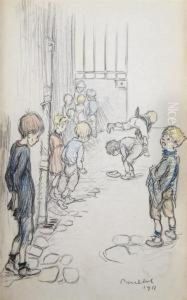Jehan Rictus Paintings
Jehan Rictus, born Gabriel Randon de Saint-Amand on September 23, 1867, in Boulogne-sur-Mer, France, was not a visual artist but a French poet known for his dialect poems that reflect the Parisian slang (argot) of the late 19th and early 20th centuries. Rictus's work is characterized by its gritty portrayal of the urban poor and an expressive use of the Parisian vernacular, which gave a voice to the marginalized communities of his time.
Although he initially started a military career, Rictus soon turned to poetry, moving to Montmartre, the bohemian district of Paris, where he became part of the vibrant artistic community. His early works were published under his birth name, but he adopted the pseudonym Jehan Rictus, which he felt better reflected his poetic persona. In 1895, he published his most famous collection, 'Les Soliloques du Pauvre,' which brought him recognition for its poignant depiction of the hardships faced by the urban underclass.
Throughout his career, Rictus continued to write and perform his poetry, often in the cabarets of Montmartre and other Parisian neighborhoods. His ability to capture the essence of the city's underbelly in a language that was alive with the rhythms and colloquialisms of the streets set him apart from his contemporaries. Despite his focus on the plight of the poor, Rictus's work was not without hope and often contained an undercurrent of solidarity and resilience.
Jehan Rictus's contributions to French literature were significant in that he helped to legitimize the use of vernacular language in poetry. His work provides valuable insight into the socio-cultural landscape of Paris at the turn of the century. Rictus passed away on November 6, 1933, in Paris, leaving behind a legacy as a poet of the people and a chronicler of the Parisian lower classes.
